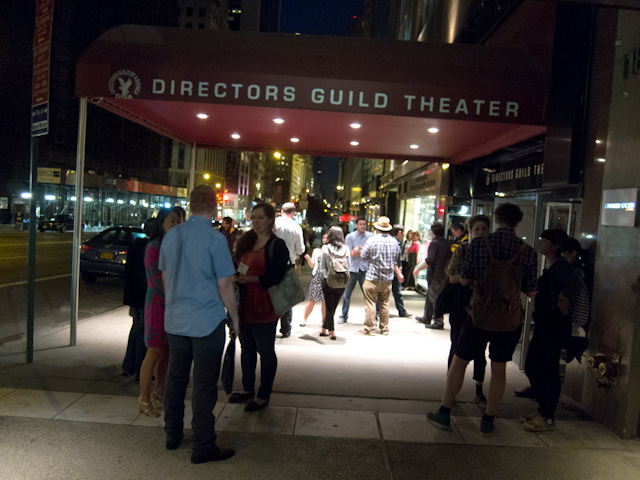LINDSAY AT ACE EDIT FESTS NY AND LA 2012
/By Lindsay Utz, 2012 Fellow
One of the greatest benefits of the Fellowship is a pass to both of the ACE Edit Fests: one in NY (June 8-9, 2012) and the other in LA (Aug 3-4, 2012). Each consisted of two days of panels with film and TV editors. I'd never been to either one, but I immensely enjoy any sort of conference where people talk about their creative process. In what can be such a solitary profession, it's so inspiring to hear other editors discuss the ins and outs and ups and downs of their work. Just as I was looking forward to attending Edit Fest NY, ACE invited me to be on a panel called The Documentary Edit: Nonfiction vs The Truth to talk about working on Bully and my other projects. Of course I said yes!
The opening night panel at the Directors Guild Theater on W. 57th was called The Lean Forward Moment. Each editor picked a sequence from a feature film in which the editing inspired them. Lance Edmands (Tiny Furniture) showed the opening sequence from the 1973 film Don't Look Now, edited by Graeme Clifford. Wow! I had completely forgotten about how much I loved this film when I first saw it, and I saw it so long ago (before I became an editor) that I'm not sure I truly appreciated the editing. The cuts in this opening sequence are artfully jarring, frenetic in composite and unexpected, which leads to a feeling of fear and disorientation. If we, as editors, are in the business of producing feelings in our viewers, this is a great example of how it's done.
After that, there was a Friday night cocktail party next door at Le Parker Meridien Hotel where we had a chance to mingle with conference participants and take in the stellar views from the rooftop patio—after all, no NYC conference would be complete without a swanky high altitude after-party!
My panel was the first one on Saturday morning at 10 am. I wasn't expecting much of a turnout at that hour but the devoted editors and cinephiles of NYC didn't disappoint. On my panel were editors Lewis Erskine (Freedom Riders, Toots), David Tedeschi (George Harrison: Living in the Material World) and Arielle Amsalem (By the People: The Election of Barack Obama, The Education of Dee Dee Ricks). It was moderated by David Zieff (The Cove, The Awful Truth).
We discussed a range of questions: how did we get inspired to become editors; how do we approach a non-fiction edit with the sheer mass of material that is shown; how did the story evolve and how was the film treated before; during and after we knew what you were dealing with; how do we seek, discover and develop our story? Do we get guidelines from the director or have an internal sense of story or some combination? When the film advocates a particular point of view or desired response how does that affect our work with the director? For a good recap on what we said to all of these things, check out this site.
It was a little nerve-wracking to get up in front of other editors and discuss what actually is essentially a private process. In a way I felt vulnerable talking about my experience. Documentary editing is a complicated and magical, but sometimes ethically tricky craft. Discussing it on stage is an equally complicated task. Somebody asked me afterward if maybe I was too honest. I thought that was a funny question because if you can't be honest in front of a roomful of editors, where can you be?
Later in the day I really enjoyed hearing Christopher Tellefsen (Moneyball, Capote) discuss his work, especially the masterfully taut gallows execution scene from Capote, one of the best dramatic accounts of a true story I've ever seen. As a side note, In Cold Blood is one of my favorite books and is something I return to a lot when I struggle in the edit room; it informs a lot of the techniques nonfiction writers (and therefore documentary film editors) employ in books and film today. I actually reread it when I was working on Bully in order to get my brain thinking about alternative ways to structure a story.
Ellie Lee and Lindsay Utz at Edit Fest LAIn August I flew to Los Angeles to attend Edit Fest LA. That event had an entirely different feel both because of where it took place (on the historic Universal Studios lot) and because the programming was more centered around fiction, 3D and animation—appropriately so since that's what most LA editors are working on. Even though I'm primarily a documentary editor, I found much overlap in the challenges that fiction editors face in the edit room. One point in particular was made during the opening night panel in which fiction editors discussed how, because shooting digital is so cheap compared to rolling film, they're dealing with such a higher ratio of footage these days and that actors actually end up rehearsing their scenes now while the camera is rolling. It made me think about how it brings a sort of documentary element to fiction filmmaking.
Lindsay and Kate Amend at Edit Fest LAThe highlight as always during my trip to LA was the people I met through the help of the fellowship and ACE: lunch with Leo Trombetta (Mad Men, Little Children), chatting with Carol Littleton (ET, The Rum Diary) over lunch and meeting superstar doc editor Kate Amend (The Long Way Home, Thin) for drinks at the closing party. They're all such wonderful editors who were full of fun anecdotes about their own work. I also finally got to meet Jenni McCormick, Executive Director of ACE, who was awesome about introducing me to people throughout the weekend. Jenni knows everyone! I look forward to staying in touch with all of them.





